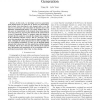Free Online Productivity Tools
i2Speak
i2Symbol
i2OCR
iTex2Img
iWeb2Print
iWeb2Shot
i2Type
iPdf2Split
iPdf2Merge
i2Bopomofo
i2Arabic
i2Style
i2Image
i2PDF
iLatex2Rtf
Sci2ools
PIMRC
2010
IEEE
2010
IEEE
The role of channel states in secret key generation
In this work, we investigate secret key generation from channel states. We point out, by means of a packet-delaybased attack, that observing its own channel states is not the only way an adversary can learn about the channel states of the legitimate communicating parties. The attack suggests that it is not secure to transmit data via the channel whose states generate secret keys. However, not using the channel at all would result in a waste of bandwidth. Hence, we propose using this channel to transmit the bits needed to reconcile the channel state estimates at the transmitter and the receiver. This is a necessary step in secret key generation that required a separate channel in previous work. Although the scheme proposed here in effect prohibits the use of an adaptive transmitter, we show, for the Rayleigh fading channel, that a decent key rate that outperforms existing schemes is obtained. This is due to the fact that collection of the channel state information and transmission of th...
| Added | 14 Feb 2011 |
| Updated | 14 Feb 2011 |
| Type | Journal |
| Year | 2010 |
| Where | PIMRC |
| Authors | Xiang He, Aylin Yener |
Comments (0)

